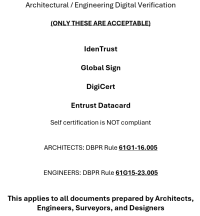Yankee Chronicler
REGISTERED
Did you check out the link I sent you that summarizes all 50 states requirements? As you can see, most states are very similar with the wording, with some states, such as Florida (touched on above by jar546).
Your link takes me to a web page from which I can purchase a copy of the document. I'm not an engineer nor a member of the NSPE, so I don't qualify to get it free, and I'm not certain that it's worth $10 to me when there are other sources available at no cost. That said, from what I've seen most states have language that either explicitly says third-party authentication is required, or implies it. I was both surprised and amused to learn that Hawaii specifically allows only physical, "wet" seals and signatures -- even today.

